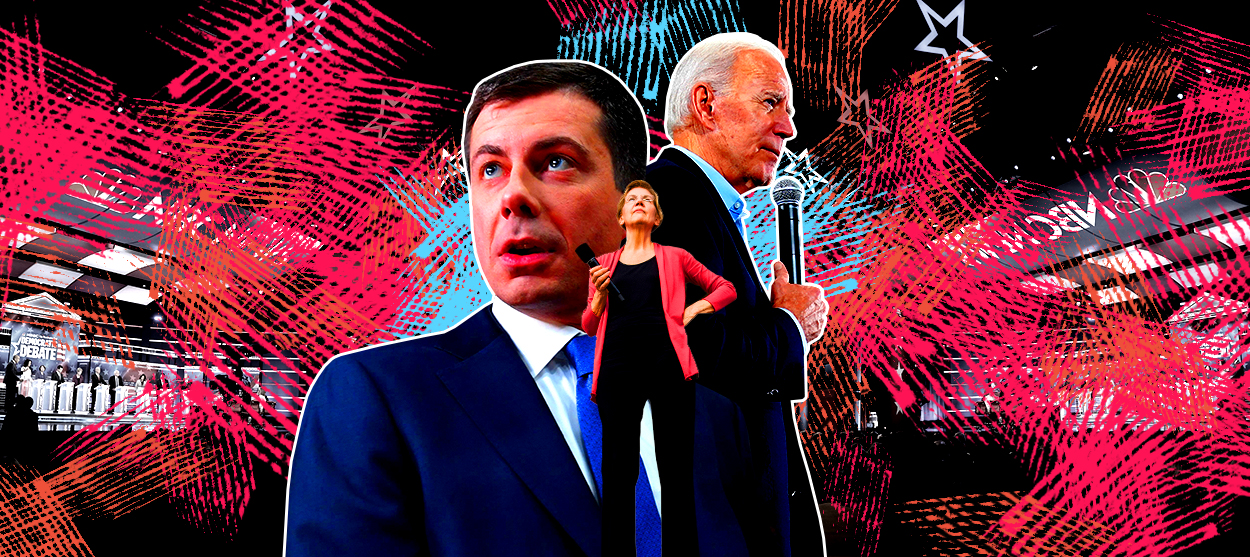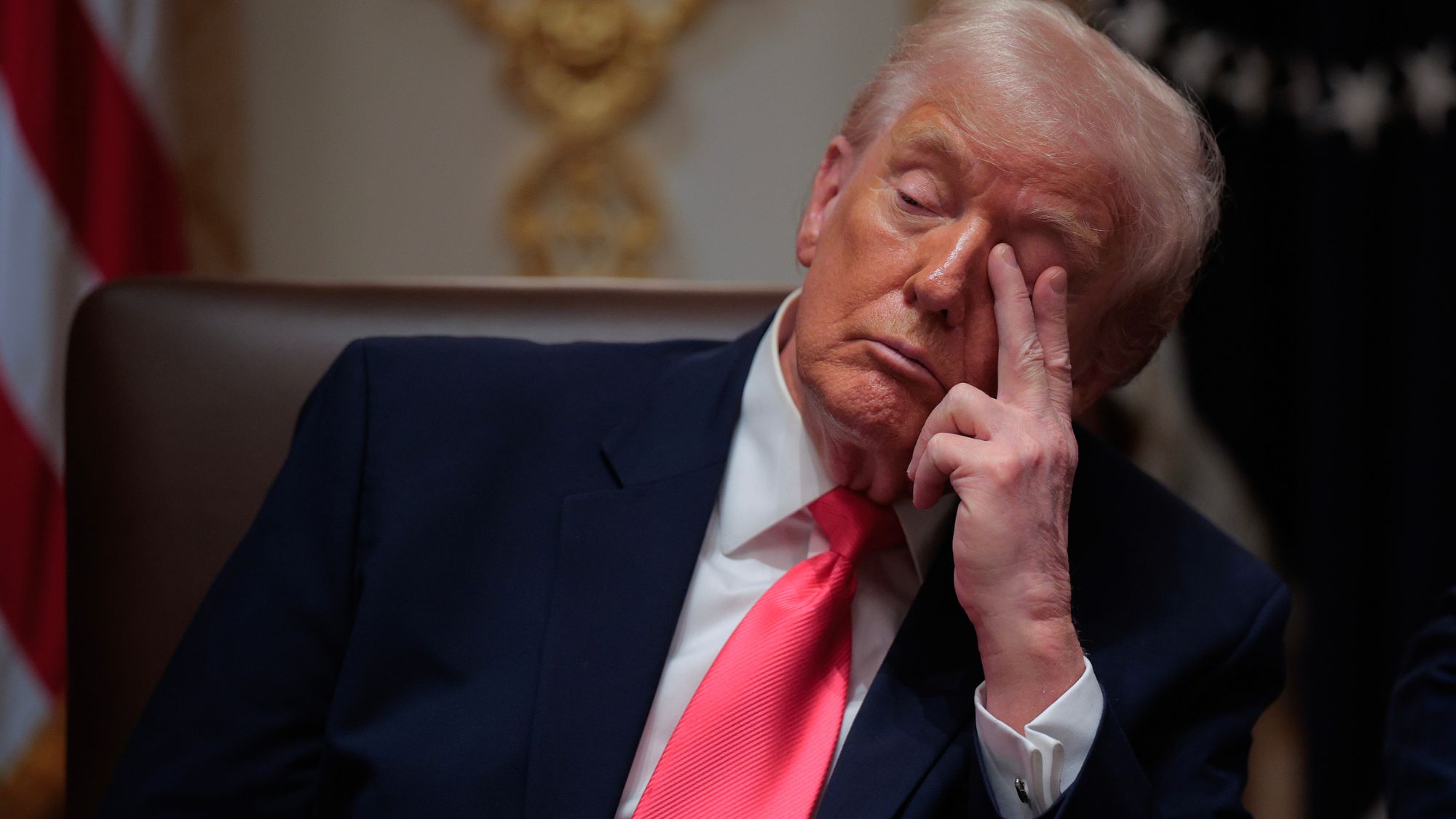How the fall of Elizabeth Warren has shaken up the 2020 race
Here come the conquering moderates — and Bernie!


A free daily email with the biggest news stories of the day – and the best features from TheWeek.com
You are now subscribed
Your newsletter sign-up was successful
As the Democratic candidates prepare for their last debate of the year, the race for the nomination has been reshaped again. The dramatic and sudden decline in Sen. Elizabeth Warren's (Mass.) polling has left progressive Sen. Bernie Sanders (Vt.) as the main counterweight to three ascendant moderates: former Vice President Joe Biden, South Bend, Indiana, Mayor Pete Buttigieg and Minnesota Sen. Amy Klobuchar. For the first time since Warren began her steady climb, it seems like a majority of Democratic primary voters currently prefers a moderate.
Wasn't this the year that Democrats were going to make a decisive turn to the left? It certainly seemed like the primary was following the script of a newly radicalized party when Warren briefly overtook Biden for the national polling lead in September, and scraped her way to the top of early state polling in Iowa and New Hampshire. But since then, she's made a series of missteps that have cost her that lead and then some.
Warren's decline has many causes. Unable or unwilling to get to the left of Sanders, she is the only candidate still in the race getting hammered from both sides of the party's ideological spectrum. While Sanders himself has mostly refrained from taking her on directly, his proxies savaged both her plan to pay for Medicare-for-all without raising middle class taxes, as well as her phased-in approach to the policy. An endorsement from the beloved, dying progressive activist Ady Barkan did nothing to stop the bleeding.
The Week
Escape your echo chamber. Get the facts behind the news, plus analysis from multiple perspectives.

Sign up for The Week's Free Newsletters
From our morning news briefing to a weekly Good News Newsletter, get the best of The Week delivered directly to your inbox.
From our morning news briefing to a weekly Good News Newsletter, get the best of The Week delivered directly to your inbox.
Worse, she seemed to walk back from her embrace of the Sanders plan, at least its timeline, which alienated supporters on the left for whom health care is the most important issue and gave grist to establishmentarians eager to paint her as untrustworthy. And in the past two debates, Buttigieg, Biden, and Klobuchar — who is finally getting some traction in Iowa — successfully teamed up to paint Warren's health-care reform as too radical.
They've collectively gotten a huge boost from deep-pocketed health-care industry giants who have been blanketing early voting and swing states with ads against Medicare-for-all under the guise of anodyne-sounding organizations like The Partnership For America's Health Care Future. That plan has been out there since it was leaked to The Intercept just after the midterms, a strategy designed to make Medicare-for-all have "support only from the far left."
It's working. The phenomenal national and early-state rise of Buttigieg, an opponent of Medicare-for-all, seems to have come entirely at the expense of Warren. Like Biden, Buttigieg is loathed by the left-wing Twitterati and has almost no support from younger Democrats despite his ostentatious effort to position himself as the vanguard of a new generation. But his relentless attacks on Warren's health-care plan have convinced a slice of her supporters that somehow the mayor of a mid-sized town is a safer bet against President Trump than she is. The theatrical entry into the race of billionaire and former New York City Mayor Michael Bloomberg last month only reinforced the sense that party elites and center-leftists were in a state of full-blown panic about a Warren nomination.
Yet the unsubtle moderate mob hit on Warren, as successful as it has been, has also had the unintended effect of boosting the fortunes of Sanders. He's up more than three points in the polling average since his campaign announced he had suffered a heart attack on Oct. 4 — a time when he had fallen behind Warren and seemed at risk of falling out of the race altogether. But he looked healthy and unfazed in the Oct. 15 debate and rolled up a series of important endorsements. Flanked by the wildly popular young progressive Rep. Alexandria Ocasio-Cortez, Sanders has taken second place back from Warren, looks like he's surging in Iowa, and has even led some polls of California and New Hampshire. But Sanders, like Warren, would need momentum from early state victories to cut into Biden's leads in the Super Tuesday states. Coming close probably won't cut it.
A free daily email with the biggest news stories of the day – and the best features from TheWeek.com
Warren and Sanders both might also be suffering from the ongoing economic expansion. With unemployment and inflation both low, the argument for aggressive economic policy change isn't finding the audience it might have in the midst of a recession. I don't have any data to back this up, but my hunch is that a large slice of the primary electorate thinks the economy will still be humming along nicely in November, and that a moderate whose message is "Look at me, I'm normal and I'll keep the good times rolling, just without the misogyny, the acts of genocide at the border, and the relentless assault on truth and the rule of law" stands a better chance than someone promising a fundamental revision of the nation's economic system.
Presiding toothily over all of this chaos is Biden, the man who remains the race's frontrunner. Despite his terrifyingly incoherent debate performances, his inability to come up with a convincing one-sentence explanation of the Hunter Biden scandal, and his almost total lack of appeal to anyone under the age of 45, the former vice president is sitting just about where he was from the get-go in national polling: in first place, with a clear path to the nomination.
Everyone has taken a turn trying to eat into Biden's lead, and no one has really succeeded. The ones who came at Biden hardest — California Sen. Kamala Harris and former HUD Secretary Julian Castro — are gone or on the ropes. Despite trailing in both Iowa and New Hampshire, Biden still looks set to win Nevada and South Carolina and then catapult himself to a dominant Super Tuesday. He's up big in Texas and he's led three of the last four surveys of delegate-loaded California. If he wins Texas, North Carolina, Alabama, Arkansas, and Virginia and finishes in the top three in California, it's hard to see how or where other candidates would make up those delegates.
Where does that leave the field? Klobuchar, who cracked double digits for the first time in a recent Iowa poll, absolutely must win Iowa to be viable moving forward. She almost certainly needs to go harder and more ruthlessly after Buttigieg — a Chris Christie-like moment of humiliation could cut him down to size and give her a shot at his supporters. Biden likely wants to avoid getting routed in both Iowa and New Hampshire, but his campaign doesn't think he needs to win either state. Buttigieg, on the other hand, might want to lay off Warren for a while. He has already picked off the moderate faction of her coalition, and if she gets knocked out early — probably by failing to win either Iowa or New Hampshire — her remaining supporters would disproportionately go to Sanders.
With more than a month-and-a-half, the holidays, the formal impeachment of the president, his Senate trial, and God knows what else to go before Iowa votes, there's still plenty of time for Warren to recover her momentum, for Sanders to to close the gap with Biden in national polling, or for the race to be shaken up in ways we can scarcely foresee now. For now, though, Buttigieg, Biden and the moderates appear to have the upper hand.
Want more essential commentary and analysis like this delivered straight to your inbox? Sign up for The Week's "Today's best articles" newsletter here.
David Faris is a professor of political science at Roosevelt University and the author of "It's Time to Fight Dirty: How Democrats Can Build a Lasting Majority in American Politics." He's a frequent contributor to Newsweek and Slate, and his work has appeared in The Washington Post, The New Republic and The Nation, among others.
-
 Local elections 2026: where are they and who is expected to win?
Local elections 2026: where are they and who is expected to win?The Explainer Labour is braced for heavy losses and U-turn on postponing some council elections hasn’t helped the party’s prospects
-
 6 of the world’s most accessible destinations
6 of the world’s most accessible destinationsThe Week Recommends Experience all of Berlin, Singapore and Sydney
-
 How the FCC’s ‘equal time’ rule works
How the FCC’s ‘equal time’ rule worksIn the Spotlight The law is at the heart of the Colbert-CBS conflict
-
 The ‘mad king’: has Trump finally lost it?
The ‘mad king’: has Trump finally lost it?Talking Point Rambling speeches, wind turbine obsession, and an ‘unhinged’ letter to Norway’s prime minister have caused concern whether the rest of his term is ‘sustainable’
-
 The billionaires’ wealth tax: a catastrophe for California?
The billionaires’ wealth tax: a catastrophe for California?Talking Point Peter Thiel and Larry Page preparing to change state residency
-
 Bari Weiss’ ‘60 Minutes’ scandal is about more than one report
Bari Weiss’ ‘60 Minutes’ scandal is about more than one reportIN THE SPOTLIGHT By blocking an approved segment on a controversial prison holding US deportees in El Salvador, the editor-in-chief of CBS News has become the main story
-
 Trump’s poll collapse: can he stop the slide?
Trump’s poll collapse: can he stop the slide?Talking Point President who promised to ease cost-of-living has found that US economic woes can’t be solved ‘via executive fiat’
-
 Memo signals Trump review of 233k refugees
Memo signals Trump review of 233k refugeesSpeed Read The memo also ordered all green card applications for the refugees to be halted
-
 Has Zohran Mamdani shown the Democrats how to win again?
Has Zohran Mamdani shown the Democrats how to win again?Today’s Big Question New York City mayoral election touted as victory for left-wing populists but moderate centrist wins elsewhere present more complex path for Democratic Party
-
 Millions turn out for anti-Trump ‘No Kings’ rallies
Millions turn out for anti-Trump ‘No Kings’ ralliesSpeed Read An estimated 7 million people participated, 2 million more than at the first ‘No Kings’ protest in June
-
 Democrats: Harris and Biden’s blame game
Democrats: Harris and Biden’s blame gameFeature Kamala Harris’ new memoir reveals frustrations over Biden’s reelection bid and her time as vice president
